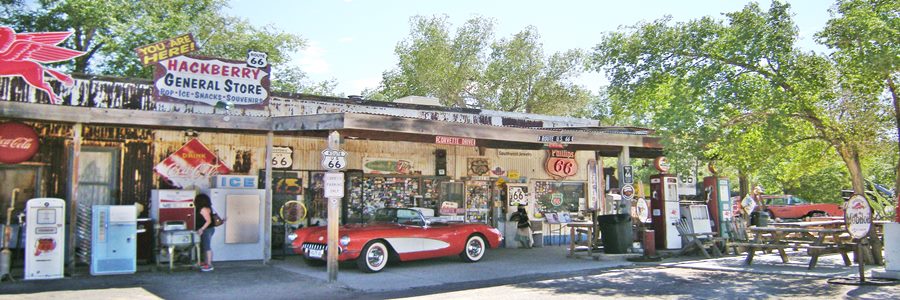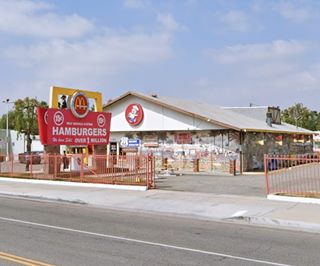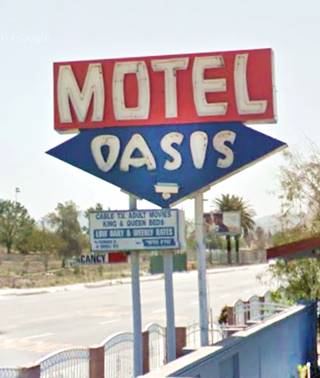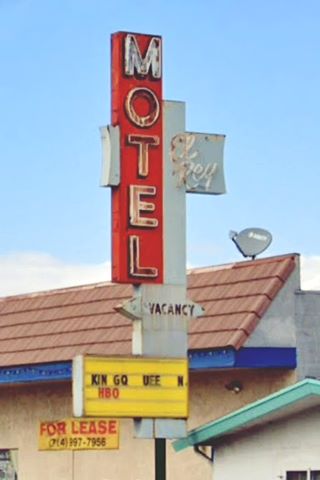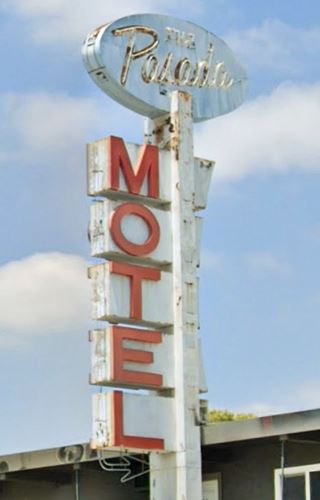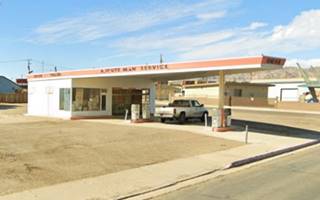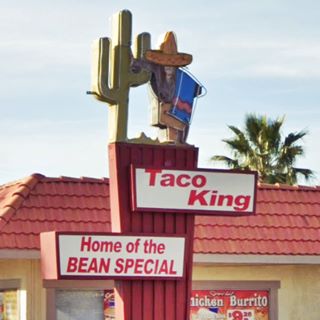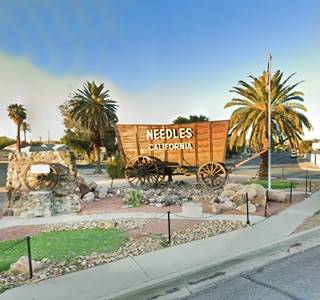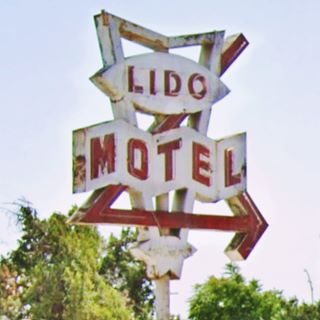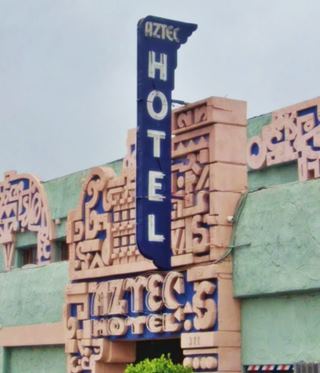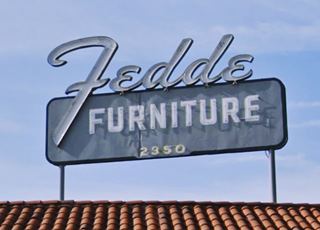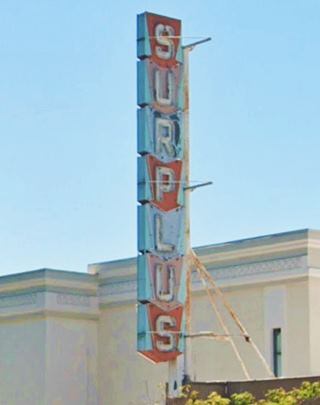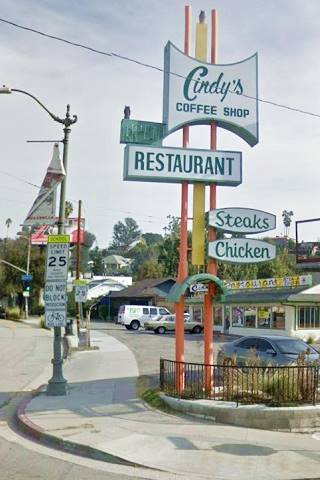California & Route 66
Index to this page
About California
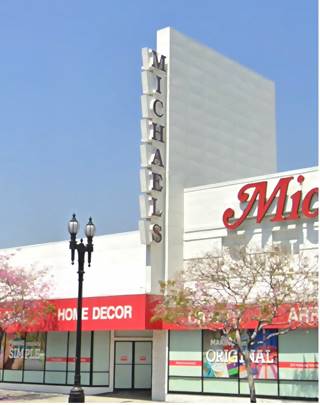
Historic Michaels neon sign in Pasadena
Click for St. view.
Facts, Trivia and useful information
Area: 163,696 sq. mi. (423.970 km2). Population: 39,128,182 (2025).
Width: 250 mi. (400 km). Length 770 mi. (1.240 km)
Time zone (along U.S. 66 alignment): Pacific (PST): UTC minus 8 hours. Summer (DST) PDT (UTC-7).
How much of Route 66 is still driveable in California?
Many people ask us:
>> How Much Of Route 66 Is Still Driveable In California?
Answer: Over 95% of Route 66 in California is still driveable.
- Nickname: "The Golden State"
- Motto: "Eureka"
- Capital: Sacramento
- Highest point: Mount Whitney 15,505 ft. (4.421 m)
- Most populous state in America.
- Third largest state in the U.S., after Alaska and Texas.
- Admitted as the 31st state of the Union on September 9, 1850
- Route 66 length in California is 333 miles (536 km).
The "End of the Trail" sign on Santa Monica Pier
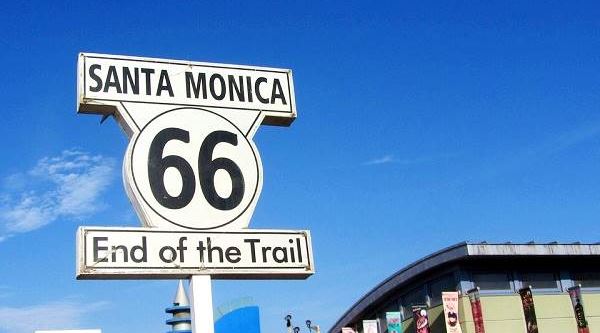
Name: California
Chivalry novels were popular in Spain during the 1400s and 1500s. One of them, "Las Sergas de Espladian" ("The Adventures of Espladian") written in 1510 by Garci Rodríguez de Montalvo mentioned a mythical island located on the western coast of the Indies, named California after its Queen, Calafia.
By the way, Patagonia in Argentina also derived its name from a character of a chivalry novel (Patagón).
Strangely enough, California appeared on a map drawn in 1622 by Michiel Coljn, of Amsterdam, as an island.
History of California
Human beings have been living in California for at least 12,000 years. It had over 70 different Native American groups during the historical period.
The Spanish sailed along its coasts in 1542 and incorporated it to the Spanish Viceroyalty of New Spain (current Mexico). In 1769 Spanish missionaries established towns around their missions, which would later develop into modern cities like Los Angeles (which in Spanish means: "The Angels") and San Diego ("St. James").

Mexico retained California after its independence from Spain in 1821, but a growing inflow of American settlers, miners and trappers would create unrest and revolts during the 1830s and 40s. The 1846 rebellion led to the creation of the California Republic and after the Mexican American War (1848), the area was ceded to the U.S.
It joined the Union in 1850 as a slave-free state. The transcontinental railroad linked it to the rest of the nation in 1869.
Route 66 was created in 1926 and served as road to jobs in California for those escaping from the Dustbowl and Depression in the 1930s. World War II saw a boom in traffic and the postwar period brought a new wave of migrants from the east. Freeways, like the Arroyo Seco Parkway (first in the West, and second in America) were built, and suburbia boomed.
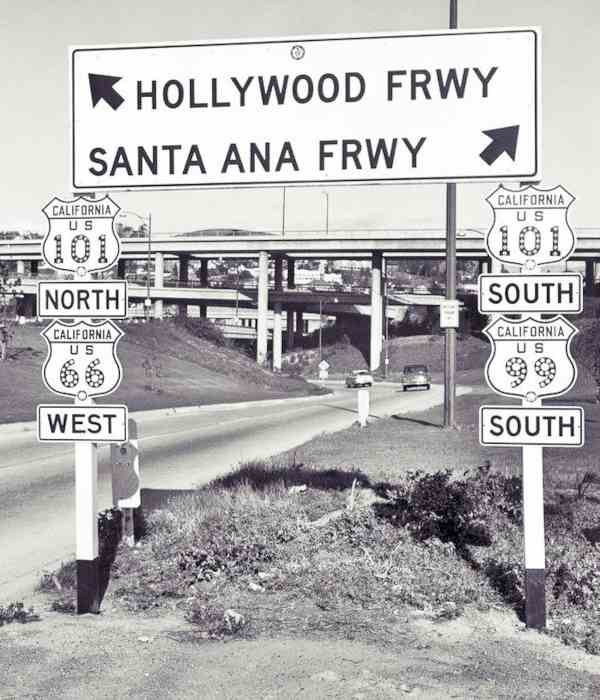

California, its Geography
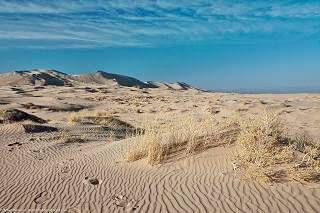
Kelso Dunes in Mohave Preserve CA. Source
The northern two thirds of the state are cut by the California Central Valley running parallel to the coast and bound on the west by coastal mountains and on the east by, from north to south, the Cascade Range, the sierra Nevada (Spanish for "Snowed Mountains") and the Tehachapi Mountains.
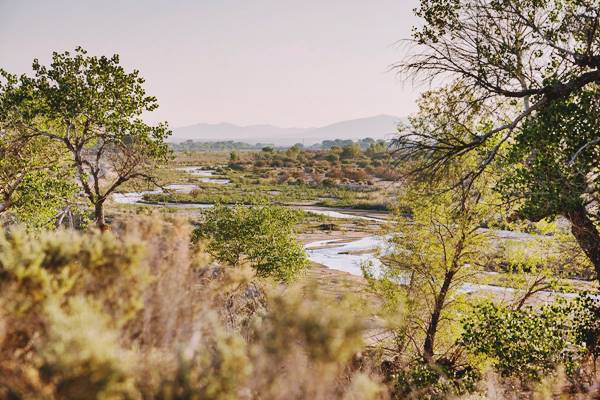
The southern third of the state (crossed by Route 66) is a relatively flat 1000 - 2000 ft. high arid area (The Mojave Desert), bound on the east by the Colorado River, and on the west by the Sierra Madre, San Rafael, San Gabriel, San Bernardino and San Jacinto Mountains.
View of the San Gabriel Mountains seen from Cajon Pass
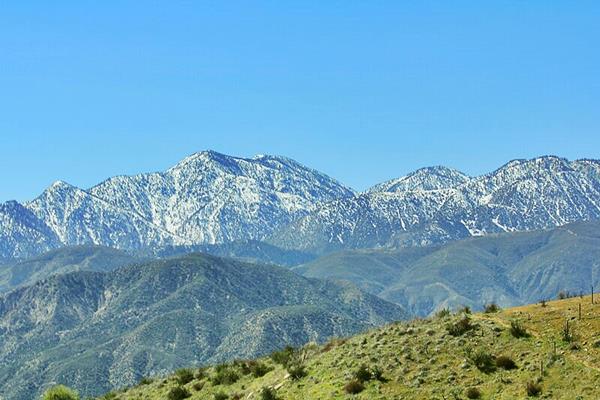
To the north lies the depression of Death Valley and to the south another depression with the salt water Salton Sea Lake in the Colorado Desert.
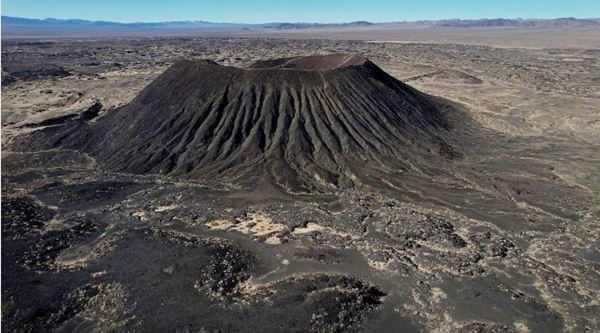
There are lava flows and volcanos along Route 66 near Ludlow and Amboy. California has a relatively high Earthquake risk: the The San Andreas Fault passes through Cajon Pass next to U.S. 66's alignment between San Bernardino and Victorville.
California's Climate
Its size and relief give it many different climate zones. US 66 crosses its Southern part, that has a Mediterranean Climate, cooler and less extreme along the Pacific coast, more continental and extreme further inland.
The coastal mountains block humidity from reaching the interior and create the deserts east of them; provoking hot summers and cold winters.
Death Valley has the record of highest temperature in the world (134°F - 57°C). Rainfall is limited in the Mojave Desert. July temperatures can range from the 105 to 75°F (40 - 24°C) in summer to 60 - 40°F (15 to 4°C).
The Mexican Monsoon or "Southwest Monsoon" funnels moisture from the Ocean (The Pacific and also the Gulf of Mexico) into the desert region of the Southwest causing strong thunderstorms with intense downpour over the mountains.
Tornadoes are extremely unlikely in this area.
Thunderstorm looms over the Mojave in California.
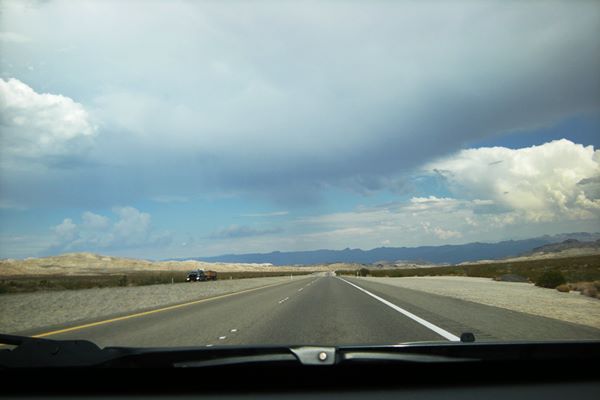
The day we took the picture shown above, on July 28, 2013 it poured; rain fell like cats and dogs and visibility was virtually zero. Traffic slowed down and even stopped on I-40, everyone was pulling over onto the shoulder. We had to take a detour (via US 95 through Laughling Nevada and US93) to reach Kingman as the freeway was flooded east of Needles!
Cities
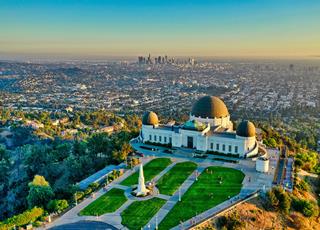
Griffith Observatory, Los Angeles. Source
Click to enlarge
Los Angeles Population 3.822.000 (2024) also known by its initials, L.A., was the western terminus of Route 66 from 1926 to 1935, and the highway crossed it until 1964. It is the second largest metropolitan area in the US with nearly 18 million residents. San Diego (Pop. 1,388,996) is the second largest city in California. Around 2.3 Million people live along Route 66's corridor through California.
Culture

The head of "Chicken boy". Los Angeles. Source
Californian Culture is a blend of Western US and Hispanic influences. It is often evoked as a land of freedom, a paradise along the Pacific coast, a high-tech, young society. The land of Hollywood, Disneyland and open-minded San Francisco.
Los Angeles is best known for its movie industry and the wealth and riches in Beverly Hills.
The old Stout Texaco restored:
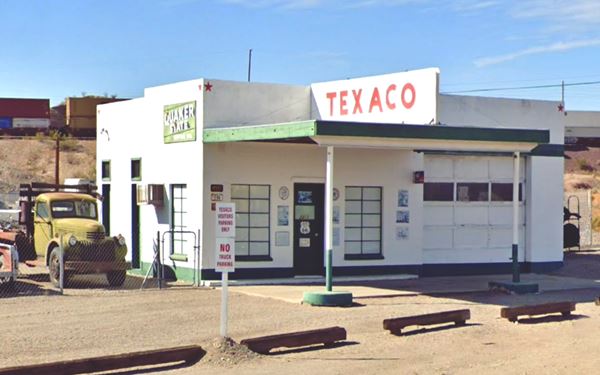
Where to Stay in California
Find your Hotel or Motel in CA
The towns along Route 66 offer different lodging options. Check out the hotels and motels in the main towns.
Towns are listed from East to West
RV Parks
>> Check out RV and Motorhome Parks & Campgrounds in California
Map of Route 66 through California
Find descriptions with maps of the full itinerary of U.S. Hwy 66 from its starting point in Needles, opposite Topock AZ on the Colorado River, across the Mojave desert, St. Andreas Fault, Cajon Pass and into Los Angeles, to reach the Pacific Ocean, the "End of the Road" in Santa Monica.
Route 66 itinerary across California
Find a detailed description with modern and old maps; we divided this alignment into the following legs:
- Topock to Barstow - Map of this segment
- Barstow to Pasadena - Map of this segment
- Pasadena to Santa Monica - Map of this segment
It includes the Historic Arroyo Seco Parkway segment used by Route 66 from 1940 to 1964.

1927 Road map, SW CA
Click on image to enlarge.
Credits

1956 Shell Roadmap, SW CA
Click on image to enlarge.
Credits
Towns located on Route 66 in California
Below are links to oue pages on each city along Route 66 in CA. Click to find out about their attractions, sights, stops, weather, history, maps, and where to stay along the way.
Click on the links below for complete information on each town and village
California towns, from East to West
East
A List of California's Main Route 66 Attractions
Below we list the main attractions along Route 66 in California, there are many more. They are listed from east to west.
Things to See & Do along Route 66
The old Richfield Service Station in Rancho Cucamonga
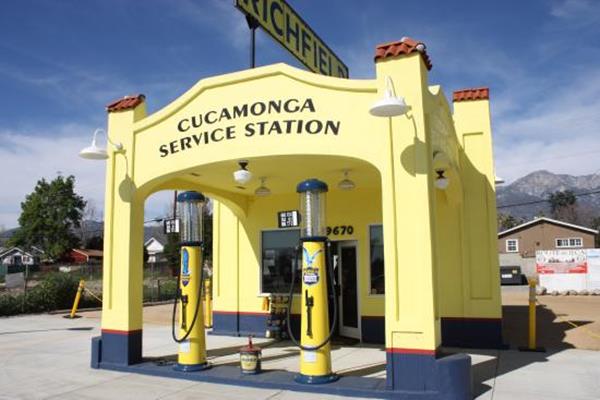
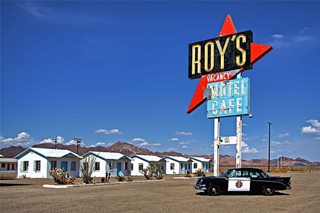
Roy's Cafe & Motel, Amboy, California
Source
The Top-Ten of Route 66 in California
- Route 66 Motel neon sign (Needles)
- Wigwam Village #7 (San Bernardino)
- Santa Monica Pier (Santa Monica)
- Bagdad Cafe (Newberry Springs)
- Elmer's Bottle Tree Ranch (Helendale)
- Aztec Hotel (Monrovia)
- Cucamonga Richfield Service Station (1915)
- Roy's Cafe and Motel (Amboy)
- Denny's Windmill Restaurant (Arcadia)
- Chicken Boy Muffler Man (Los Angeles)
Elmer's bottle Ranch on Route 66
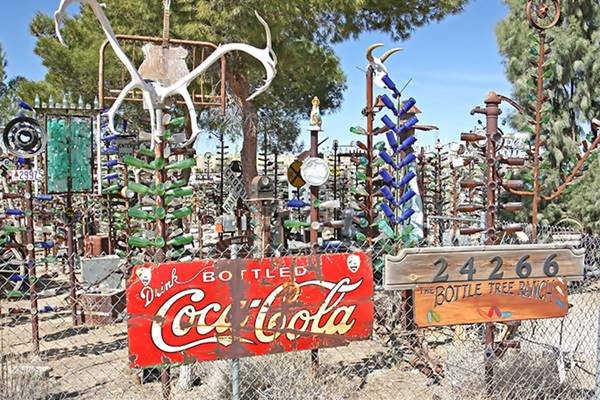
A list of California's Attractions
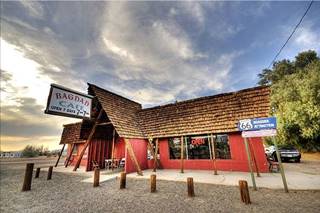
Bagdad Cafe, Newberry Springs, California, Source
Cafes and Restaurants
Wayside Cafe (Essex)
Roy's Motel and Café (Amboy)
Old Ludlow Cafe (Ludlow)
Ludlow Cafe (Ludlow)
Bagdad Cafe (Newberry Springs)
Poes Café (Newberry Springs) Gone
Kelley's Restaurant Sign (Daggett)
The Iron Hog Saloon (Oro Grande)
Emma Jean's Café and Truck Stop (Victorville)
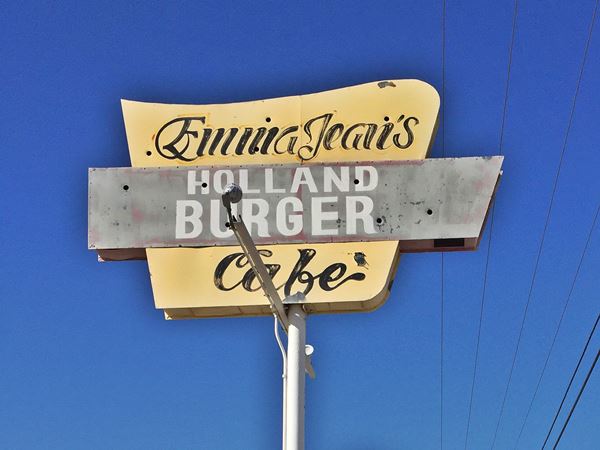

Magic Lamp neon sign. Cucamonga. Source
Summit Cafe (Cajon Pass)
Bono's Restaurant and Deli (Fontana)
The Magic Lamp (Rancho Cucamonga)
Sycamore Inn (Rancho Cucamonga)
Tugboat Annie's (Claremont)
Mr. D's Diner (La Verne)
La Paloma Restaurant (La Verne)
Pinnacle Peak Steakhouse (San Dimas)
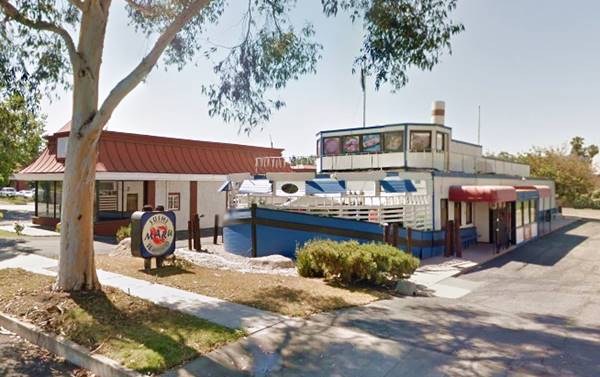
Golden Spur (Glendora)
The Hat Pastrami (Glendora)
Denny's Windmill Restaurant (Arcadia)
Gus's Barbecue (South Pasadena)
Current view of Denny's with its windmill, Route 66, Arcadia
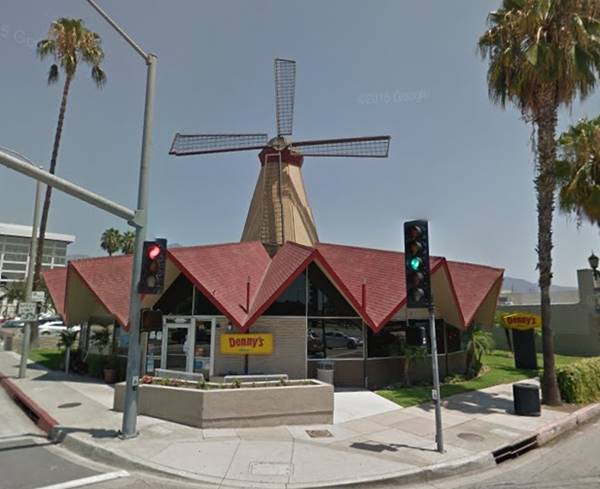
Ruins and Ghost Towns
Summit Cafe, Filling Station and cabins (Chambless)
Bagdad (Bagdad)
Siberia (Siberia)
Calico Ghost Town (Daggett)
Singular McDonald's
First ever McDonald's (San Bernardino)
McDonald's "Golden Arches" building (Upland)
Monrovia's McDonald's (Monrovia)
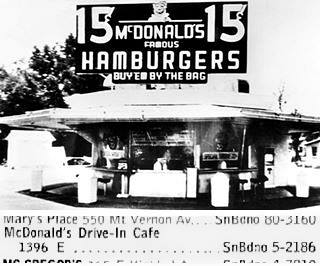
1940 McDonald's first site and 1956 phone book entry.
Classic Route 66 Motels

Fender's neon sign. Needles. Source
Needles
Route 66 Motel
Palms Motel (Old Trails Inn)
Imperial Motor Inn
Desert Inn Motel
Overland Motel
El Garces Hotel
Sage Motel
Kiva Motel
Needles Inn
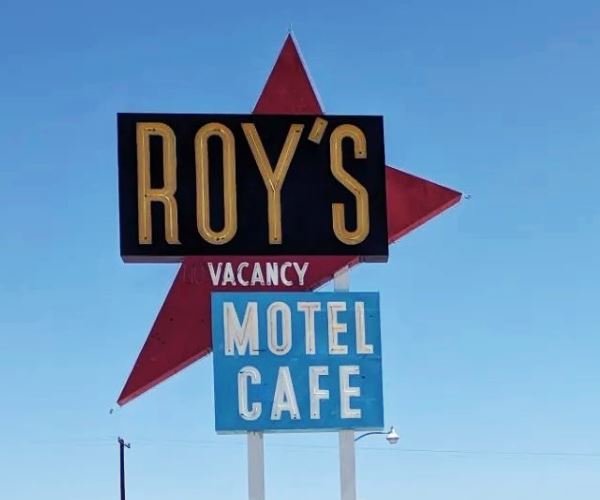

Henning Motel Sign in 2016. Austin Whittall
Chambless Camp (Chambless)
Roy's Motel and Café (Amboy)
Post Office and Motel (Ludlow)
Henning Motel (Newberry Springs)
Stone Hotel (Daggett)
Barstow
Cactus Motel
Town and Country Motel
Travelodge
Sands Motel
Sage Motel
Skyview Motel
La Siesta Motel
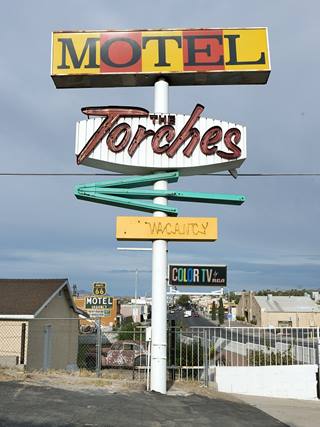
The Torches Motel neon sign, Barstow. Source
Casa del Desierto Harvey House
Desert Inn
Hillcrest Motel
Imperial 400 Motel
Casa Loma Motel
The Torches Motel
El Rancho Motel
Site of the Beacon Tavern
More Classic Motels
Lenwood Radio Auto Camp (Lenwood)
The Dunes Motel (Lenwood)
Sage Brush Inn (Helendale)
Green Tree Inn (Victorville)
Green Spot Motel (Victorville)
New Corral Motel (Victorville)
San Bernardino
Oasis Motel
Travelodge Motel
Sands Motel
Wigwam Motel
Cajon Motel
Lido Motel
Mount Vernon Motel
Valley Motel
Holiday Inn
Palms Motel
The Wigwam Motel in San Bernardino
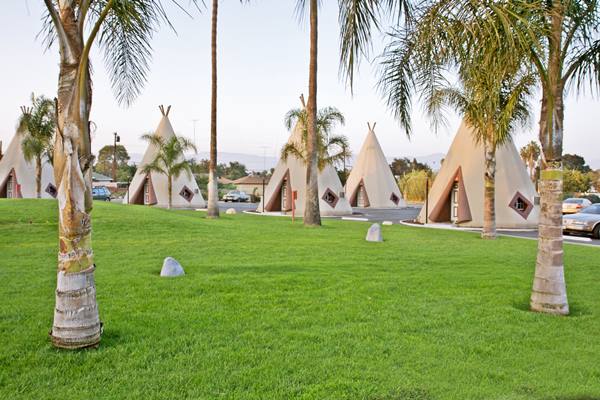
Rialto
El Rey Motel (Rialto)
Rex Motel (Rialto)
Fiesta Motel (Rialto)
Fontana
Rose Motel
Dragon Motel
Fontana Motor Lodge
Sand and Sage
Sunset Motel
40 Winks Motel
Cheryo Motel
La Villa Motel
San Gabriel Valley
Red Chief Motel (Rancho Cucamonga)
New Kansan Motel (Rancho Cucamonga)
Stardust Motel (Pomona)
20th Century Motel (Glendora)
Palm Tropics Motel (Glendora)
Stardust Motel (Azusa)
Colonial Inn (Azusa)
El Rancho Motel (Duarte)
Aztec Hotel Historic Site (Monrovia)
The Leven Oaks Hotel (Monrovia)
Oak Park Motel (Monrovia)
Frontier Motel (Arcadia)
Flamingo Motel (Arcadia)
Hotel Shirley (Sierra Madre)
Pasadena
Pasada Motel
Vagabond Inn (former Imperial 400 Motel)
Astro Motel (Now Knights Inn)
La Casa Inn (Now Swiss Lodge)
Saga Motor Hotel
Hiway Host Motel
Ace-Hi Motel
The Route 66 sign of the Hiway Host Motel
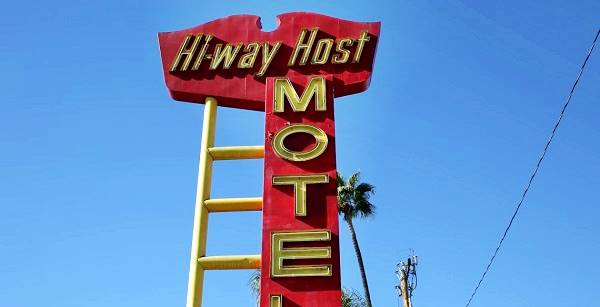
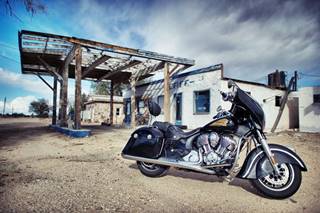
Abandoned Wayside Cafe Market and filling station, Essex. Source
Los Angeles
The Starlite Motor Hotel
The Paradise Motel
Former Temple View Travelodge
Casa Lu-An Motel
Eagle Rock Travelodge
Albert's Motel
Rose Bowl Motel
Pueblo Motel & Dining Room
Route 66 Service Stations & Garages
Wheelers Flying A Service Station (Needles)
Union 76 (Needles)
Carty's Camp Shell station (Needles)
Stout's Texaco (Needles)
Roadrunner's Retreat (Chambless)
Wayside Cafe (Essex)
The old Stout Texaco restored:

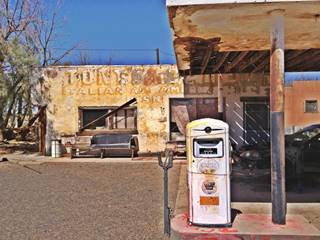
Tony's Care at the Whiting Bros. gas station. Newberry Springs CA. A. Whittall
Richfield Service Station (Ludlow)
Old Filling Station (Ludlow)
Whiting Brothers (Dry Creek) Service Station (Newberry Springs)
Mugwumps Service Station (Daggett)
Barstow Garage (Barstow)
Old Service Station (Lenwood)
Polly Gas Station Sign (Helendale)
Watson's Richfield Station (Helendale)
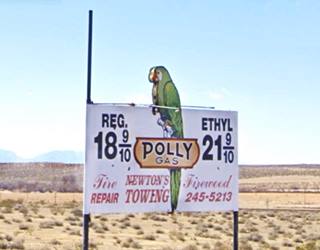
Polly gas sign in Helendale
Mohawk Service Station (Oro Grande)
Wilshire Service Station (San Bernardino)
Cucamonga Service Station (Rancho Cucamonga)
Vintage Gas Station (Pomona)
Art Deco US Gas service station (Glendora)
Union 76 (Azusa)
Flying A Service Station (Monrovia)
Brown's Gas Station (Monrovia)
Graham's Union 76 (Monrovia)
"Shed" style gas station (Los Angeles)
Union 76 Service Station (Beverly Hills)
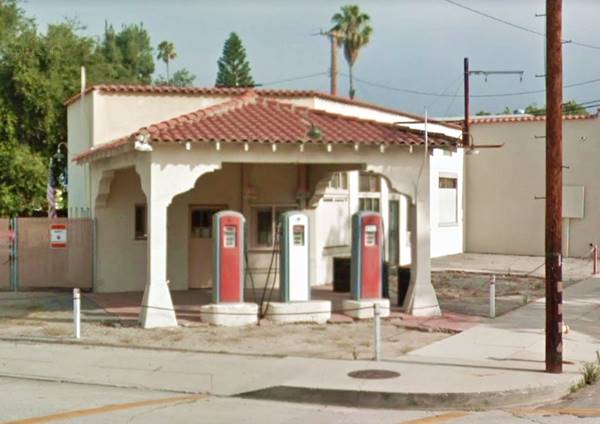
Wacky sights, Oddities, Kitsch, Americana and interesting stops
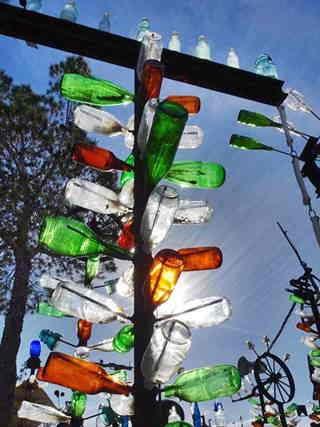
Bottle Tree Ranch. Helendale. Source. Click to enlarge
Borax Wagon (Needles)
Mystic Maze (Needles)
Tom's Certified Welding & Machine Shop (Barstow)
Bottle Tree Ranch (Helendale)
Giant Orange (Fontana) Being restored.
Oldest Winery in California (1839) (Rancho Cucamonga)
Giant Cup of Coffee (Upland)
GuinessRecord breaking Wisteria vine (Sierra Madre)
Fair Oaks Pharmacy and Soda Fountain (South Pasadena)
Location for the "Halloween" Movie (South Pasadena)
Chinatown (Los Angeles)
Chicken Boy - giant statue (Los Angeles)
Sunset Strip (West Hollywood)
Rodeo Drive (Beverly Hills)
End of the Trail sign (Santa Monica)
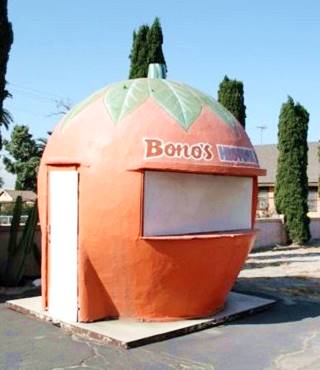
The Giant Orange fruit stand at Bono's
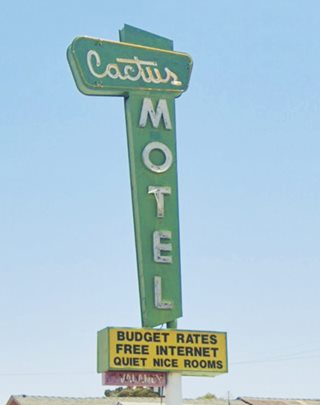
Cactus Motel Neon sign Barstow. St. view
Neon Signs
Cactus Motel neon (Barstow)
Taco King neon sign (Upland)
Vintage neon sign at Coates (Pomona)
Liquor Store Sign (Azusa)
Rod's Grill Neon Sign (Arcadia)
Michael's Store (Pasadena)
Whistle Stop Model Trains (Pasadena)
Pashgian Rugs sign (Pasadena)
Fedde Furniture Neon Sign (Pasadena)
Surplus Neon Sign (Pasadena)
Fish-shaped neon sign at Camerons (Pasadena)
Cindy's Diner Sign (Los Angeles)
Hollywood Sign (Los Angeles)
Nature, Geologic features
Amboy Crater (Amboy)
Pisgah Crater (Newberry Springs)
The San Andreas Fault (Cajon Pass)
Arrowhead (San Bernardino)
Eagle Rock Hill (Los Angeles)
Movie Theatres and Drive In Theatres
Skyline Drive In movie theatre (Barstow)
Barlen Drive In Movie Theater (Lenwood)
Art Deco theater (Fontana)
Grove Theater (Upland)
Historic Pomona Fox Theater (Pomona)
Foothill Drive-In Theater (Azusa)
Historic Rialto Theatre (South Pasadena)
Hollywood's Chinese Theatre (Los Angeles)
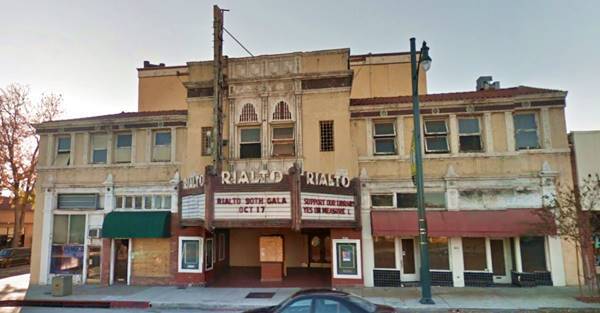
Route 66 itinerary across the state of California
Below is a detailed description of the alignment of U.S. 66 through California, from East to West. For each town we give details of Route 66's alignment through it. You can also click above on a town and read more about the course of US 66 in that specific community.
California
Route 66 in California
Current mileage: 333 mi.
Route 66 crosses California from the Colorado River to the Pacific coast, from Needles to Santa Monica through the Mojave Desert and Los Angeles.
Starting on the CA-NM state line on the Colorado River
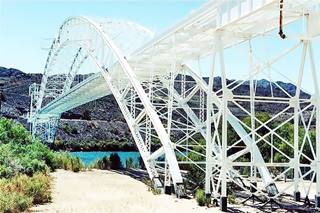
The Topock Bridge, Arizona & California. Source
We will start in the middle of the bridge on I-40, over the Colorado River, (mile zero), at the Arizona state line.
The original Route 66 Bridge is the steel arch bridge just south of I-40. It is a Historic Bridge, and it appears in the movie The Grapes of Wrath.
You are entering the driest part of the whole of Route 66, the Mojave Desert region, which was the toughest on both drivers and vehicles in the old-days. Keep on I-40, that here turns north, towards Needles. Leave I-40 at Exit 148, (6 mi.) turn west and then north along Five Mile Road, and then north along U.S. 95, pass under I-40 (at Exit 144) and enter Needles.
Needles
Visit the Historic El Garces Hotel, and the towns Classic Motels. Go through the town (13 miles) and follow Broadway St. (US 66), take a left at Needles Highway, pass under I-40 and keep north; the highway (River Road) crosses I-40 again (Exit 141 - 16 mi.). Follow the fork to the left along the National Trails Highway and return to I-40 at Exit 139 (18 miles).
Goffs
At Exit 133, (24 mi.) go north along U.S. 95 towards Goffs, then (30 miles) take a left along Highway 66. The road goes by Goffs (45 mi.) and curves to the Southwest. Goffs is the "Tortoise Capital of the World". Important: Watch our for tortoises on roads, they may drink water in puddles on roads or shoulders and can be hit by cars and killed. Drive with caution and watch for tortoises on the road or near it. Photograph them from a distance, don't touch them or disturb them. They are a protected species. If frightened they may empty their storage bladders and loose precious water, risking death.
A Desert Tortoise in the Mojave

Route 66 reaches I-40 at Fenner by Exit 107 (55 mi.) The highway is cut south of this point. You could drive south as the road goes on to meet the National Trails Highway with the post-1931 alignment south of I-40, eading with a Southwest course into Essex (visit the Wayside Cafe). Now it is cut.
Road Closures
Updated Sept. 26 2024
Since 2017 Route 66 has been closed west of Fenner all the way to Essex and from there, to Danby and all the way to Chambless. There is complete information, with maps at the San Bernardino County Road Closed web page.
West of Chambless US66 is cut at so from Essex go to I-40's exit 100 is open, so you can go along it, take I-40 westbound and then reach Chambless or Amboy via Exit 78.
Apparently Essex Rd. from Essex to I-40's exit 100 is open, so you can go along it, take I-40 westbound and then reach Chambless or Amboy and retake Route 66
by driving Kelbaker Rd. from Exit 78. There is no expected reopening date for these sections.
Back to the itinerary (remember the road closures mentioned above): After Essex comes Danby and then Chambless (see the old Store, Cabins and Store there), finally reaching Amboy (94 miles) after crossing the desert with mountains to the north and south.
Amboy
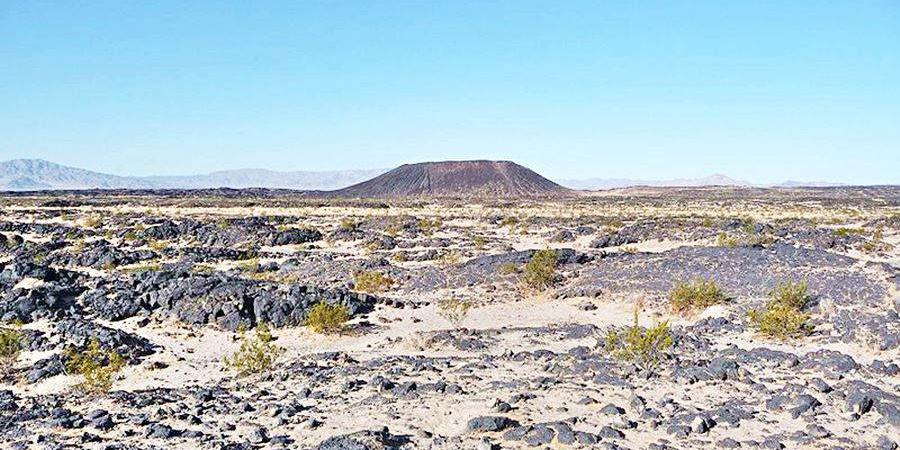

Roy's Cafe and Motel, Amboy.
See the vintage Roy's Motel and Café. The dark cinder cone of Amboy Crater is to the south of Route 66 next to the small town. The road skirts its lava field and turns Northwest passing by the ghost towns of Bagdad The driest spot in the USA and Siberia and reaching I-40 at Exit 50 at Ludlow (122 miles).
Ludlow
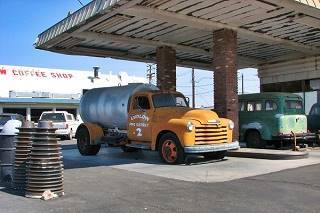
Two old trucks at the Service Station in Ludlow. Source
At Ludlow, pass under the Interstate and take a left along the north frontage road (National Trails Highway) towards the west.
Route 66 crosses to the south side of I-40, then crosses the railroad, and keeps westwards along the south side of I-40. West of the access to Exit 23 it passes by Bagdad Cafe, and reaches Newberry Springs, where it crosses I-40 at Exit 18 (154 mi.)
Follow the road along the north side of I-40 passing through Dagget (166 miles). When you reach Nebo St. you must take a left to return to I-40 (168 mi.) because although US 66 keep on straight, it enters a Marine Base.
Access I-40 via Exit 5 and just after the Base exit again (Exit 2 - 171 miles), pass under I-40 and take East Main St. towards the West, along the south side of I-40, entering Barstow (173 mi.)
Barstow
Both Barstow and San Bernardino are named in the song Route Sixty-six (Get your kicks...)
At Exit 1, follow Main St. to the north of I-40, cross I-15 and keep west. Visit the Harvey House Railroad Depot, a Historic Place with its two Museums. It has many gas stations and motels.
The road arches round Barstow, crosses CA hwy 58 and takes a Southwesterly course. Route 66 (National Trails Highway) will pass through small towns of Lenwood (179 miles), Hodge, Helendale (197 mi.), with its Polly Gas sign and Oro Grande (site of the Iron Hog biker stop) (205 miles).
Elmer's bottle Ranch on Route 66

Victorville
It becomes North D St. and passes under I-15 at Exit 153, entering Victorville (210 mi.)
Take a right onto Seventh St. southwards and at Exit 150 join I-15 southwards.
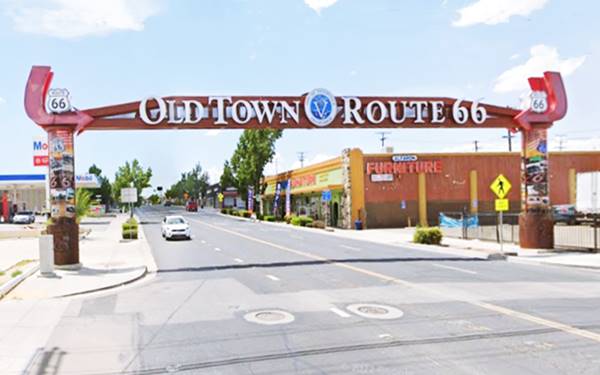
I-15 and the old alignment of Route 66 take a sharp curve towards the south through San Bernardino National Forest and crosses through Cajon Pass.
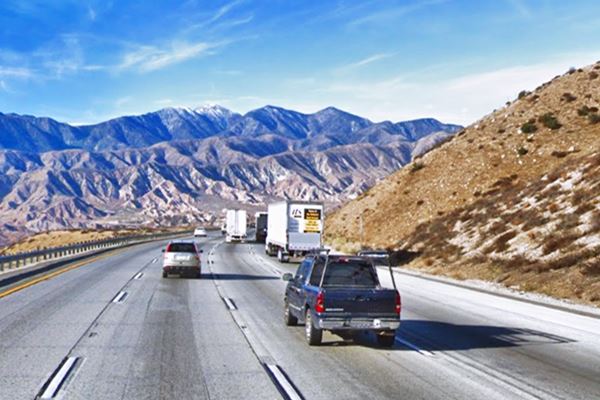
You can take Exit 129 (234 miles) and follow Cajon Boulevard, the original alignment of US 66 on the west side of I-15, stay on it, it will pass beneath I-15 at the interchange with I-215 and on its eastern side continues running beside I-215 (242 mi.) Cajon Blvd will take you into San Bernardino.
San Bernardino
The Post-1930s alignment followed Kendall St. and then south along North E. St. until W. 5th St. where it turned west again. It became ALT 66.
It was on N. E St. where McDonald's opened their first Hamburger store. Don't miss the Wigwam Village #7, a Historic Site and one of the two surviving Wigwam hotels along U.S. 66.
Cajon Blvd. turns into Mount Vernon Ave. take it south until W. 5th St. and take a right (252 miles). At Lytle Wash Creek it becomes Foothill Blvd. (CA 66).

The Giant Orange fruit stand at Bono's
Towards San Gabriel Valley
The road goes through Rialto, Fontana (259 mi.) and Rancho Cucamonga (268 miles) with a westerly direction running along the foot of the San Gabriel mountains.
It heads west through a chain of small towns: Upland, Claremont (275 mi.) , and then takes a NW course at La Verne, crossing CA 210 and going through San Dimas and Glendora (284 miles).
After Azusa it becomes Huntington Dr. through Irwindale, Duarte and Monrovia (with its historical Aztec Hotel), crosses I-210 (Exit 33 - 294 mi.) and keeps on westwards through Arcadia (there is another town with the same name in Oklahoma) until it becomes Colorado Blvd., on the south of Sierra Madre, through Lamanda Park and into Pasadena (302 mi.)
Century House location of the 1978 film "Halloween"
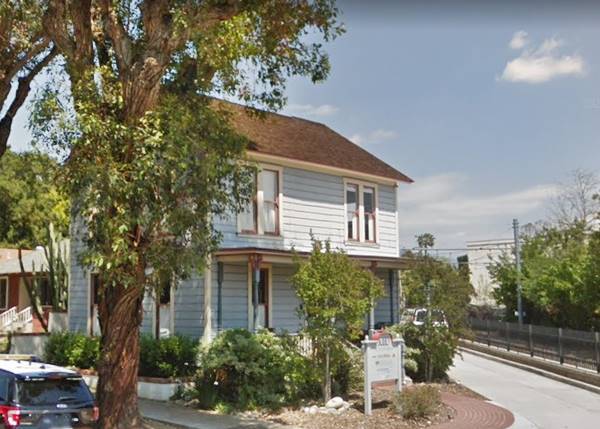
Pasadena
Some classic neon signs in Pasadena, click images for their St. view
There are several sites in Pasadena that are listed in the National Register of Historic Places: Foothill Boulevard Milestone, Howard Motor Company Building, Colorado Street Bridge, Bekins Storage Co. and the Rialto Theatre (which is in South Pasadena on an older alignment of Route 66); there are several US 66 alignments from Pasadena into Los Angeles: the original 1926 one that ended in downtown Los Angeles, later 1930-40s variants through Northeast Los Angeles, and the late 1940s ⁄ 50s road.
>> Pasadena to Santa Monica leg - Map of this segment
It includes the Historic Arroyo Seco Parkway segment used by Route 66 from 1940 to 1964.
Route 66 into Los Angeles
In downtown Pasadena take the Historic Arroyo Seco Parkway southwards which becomes CA 110 and in South Pasadena turns west as Arroyo Seco Parkway (which is a Historical Place). It passes on the north side of Montecito Heights, and right in front of the Dodger Stadium and take Exit onto US 101 N, (right - 311 miles) at the Four Level Interchange taking the Hollywood Freeway northwards.
At Exit 7, leave US 101 towards Santa Monica Blvd. (315 miles) and take a left along Santa Monica Blvd. (CA 2) Here you will meet the 1930s and 40s alignment again.
Hollywood
The Boulevard takes you through the heart of the Los Angeles Hollywood district and the neighboring city of West Hollywood famous for its Sunset Strip: and then it takes a southwesterly direction through Beverly Hills and passes under I-405 (325 mi.)
Santa Monica
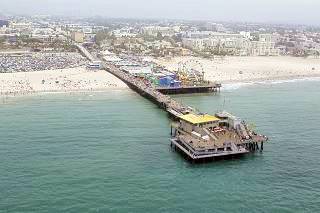
Aerial view of Santa Monica Pier, Santa Monica.
End of the Road. Western Terminus of Route 66
Original US 66 ended in downtown Los Angeles (1926) it was later moved to the Pacific Coast Highway (then US 101 Alternate) which is current SR 1, in Santa Monica, California.
It heads towards the sea, through Santa Monica. Where it used to end, until 1964, on Lincoln and Olympic Blvd. in the 30's and 40's.
But don't turn left on Lincoln Blvd. Keep straight ahead to its western terminus, on Ocean Avenue, 0.3 miles north of the Santa Monica Pier. End of Route 66. (333 miles). End of the leg and of Route 66.
There is plaque at Ocean Ave. and Santa Monica Blvd. that dedicates US 66 as the Will Rogers Highway.
Western "End" of Route 66, Santa Monica California
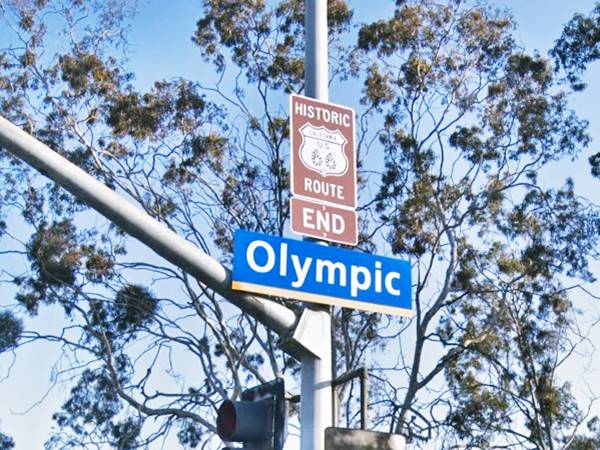

Sponsored Content
>> Book your Hotel in Santa Monica

Credits
Banner image: Hackberry General Store, Hackberry, Arizona by Perla Eichenblat.

